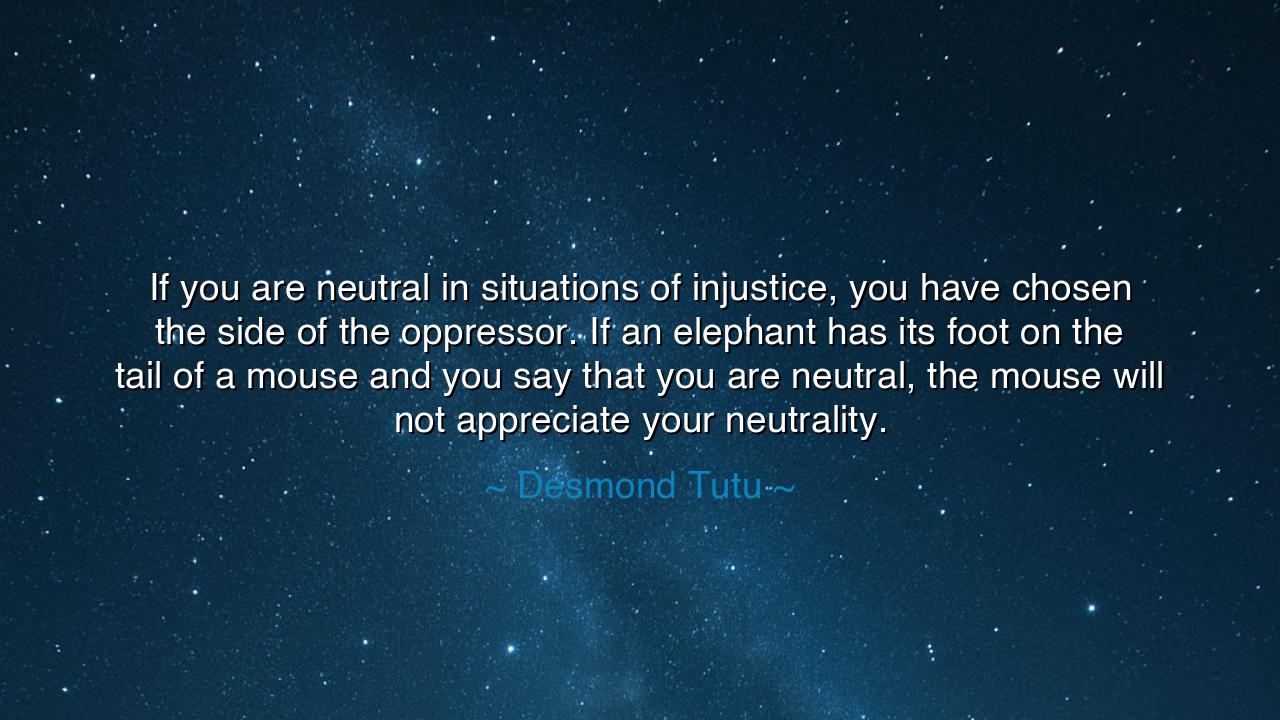
If you are neutral in situations of injustice, you have chosen
If you are neutral in situations of injustice, you have chosen the side of the oppressor. If an elephant has its foot on the tail of a mouse and you say that you are neutral, the mouse will not appreciate your neutrality.






The great moral prophet Desmond Tutu, who rose from the struggle of South Africa’s long night of oppression, once declared: “If you are neutral in situations of injustice, you have chosen the side of the oppressor. If an elephant has its foot on the tail of a mouse and you say that you are neutral, the mouse will not appreciate your neutrality.” In these words, spoken with the clarity of both wisdom and compassion, Tutu laid bare one of the deepest truths of human morality: that neutrality in the face of suffering is not virtue, but betrayal. To remain silent when another is being crushed is to lend one’s silence to the sound of the oppressor’s heel.
Born in the fires of apartheid, Tutu’s understanding of injustice was not abstract — it was lived. He saw with his own eyes the brutal machinery of racial segregation that divided his homeland: the laws that stole land, the police that silenced voices, the prisons that held men of peace like Nelson Mandela. The world, for decades, watched this cruelty unfold. Some nations protested, others profited, and many claimed neutrality — unwilling to take a stand lest they lose comfort or favor. It was to these indifferent hearts that Tutu spoke. For he knew that every act of silence in the presence of evil strengthens the hand that commits it. The elephant — vast, powerful, unthinking — continues its crushing because those who could speak do not.
In his parable of the elephant and the mouse, Tutu gave form to the imbalance that defines all oppression. The elephant, representing the oppressor, needs no assistance — it already holds the advantage. The mouse, small and fragile, struggles only for survival. To claim neutrality in such a moment is to pretend that both stand on equal ground, that justice will emerge if we simply look away. But reality, Tutu teaches, is not balanced — it is tilted by power. The cry of the weak will never be heard if the strong are not challenged. Thus, neutrality becomes a lie — a false peace that conceals violence beneath the calm surface of silence.
History bears the marks of those who remained neutral when courage was needed most. When tyrants rose in Europe and the smoke of war darkened the sky, many nations hesitated to act, hoping that neutrality would spare them the cost of involvement. Yet their inaction only fed the flames. Evil, when unopposed, grows bolder; oppression, when unresisted, believes itself righteous. So too, in every age, when the privileged remain silent while the powerless suffer, they become unwitting allies of cruelty. As Tutu’s own struggle proved, the road to freedom is never paved by those who stand still — it is built by those who take sides, who speak, who act.
Yet Tutu’s wisdom is not born of anger, but of compassion. His words do not condemn only the oppressor — they awaken the sleeping conscience of the bystander. He invites us to see that moral neutrality is an illusion, that every choice not to act is itself a decision. To be human is to be bound to the fates of others; to stand aside when they are in pain is to deny that bond. The heart that claims neutrality may call itself peaceful, but true peace cannot exist without justice. The silence of the good becomes the comfort of the wicked; the indifference of the many becomes the shield of the few who harm.
Consider the story of the American Civil Rights Movement, where men and women of color marched for dignity under the banner of nonviolence. Many white moderates of the time claimed neutrality, saying, “I agree with your goals but not your methods.” It was to them that Martin Luther King, Jr. wrote from a Birmingham jail, reminding them that waiting for justice is itself a privilege. Like Tutu, King understood that neutrality in the face of injustice only delays righteousness. In both men, the same truth burned: that goodness is not a state of passivity, but of action — of taking a side when morality demands it.
Therefore, my listener of the future, let Desmond Tutu’s words echo within your conscience. When you see injustice — whether in the laws of nations, the workplaces of the powerful, or the whispers of daily life — do not claim neutrality. Speak, even when your voice trembles. Stand, even when your legs shake. For silence may spare you for a moment, but it betrays the eternal part of you that was born to defend the light. Remember always the mouse beneath the elephant’s foot — it waits not for neutrality, but for mercy, for courage, for intervention.
So take this teaching into your heart: to be neutral in injustice is to surrender one’s humanity. The measure of a soul is not in how it avoids conflict, but in how it confronts cruelty with compassion. Let your neutrality die so that your conscience may live. Be the hand that lifts, the voice that calls, the heart that defends. For the day you refuse to choose is the day you have already chosen — and the world will know, by your silence, which side you stood on.






AAdministratorAdministrator
Welcome, honored guests. Please leave a comment, we will respond soon